Let’s Talk About Sex Education
It's back-to-school season, and I thought that now would be a good time to discuss the state of sex education in America. (Spoiler: It's bad.) According to the Guttmacher Institute, a non-profit that researches sexual health with the goal of improving sexual and reproductive rights worldwide, only twenty-five states and DC mandate the teaching of both sex education and HIV education in schools.
Even more shocking, only seventeen states require that the curriculum taught to students be medically accurate. While only ten states state that the content needs to be appropriate for the students' culture and must not be biased against race, sex, or ethnicity.
Meanwhile, twenty-nine states require that abstinence be emphasized in sex education classes, and four require that only negative information be provided about homosexuality, with a positive emphasis on heterosexuality.
Personally, I would argue that our country does not receive a passing grade when it comes to sex education. If you're wondering where your state stands, this article includes a helpful chart with all the current state policies.
During my deep dive into sex education, I came across a recent study conducted by Rescripted, a digital fertility and women's health platform. Their study, titled 'The State of Sex Ed,' surveyed a thousand people, and some of their findings were alarming, to say the least.
One finding was that 32% of people thought a tampon would prevent a menstruating person from urinating. Let's pause here to make sure that everyone reading this understands that a tampon goes in the vagina, while urine comes out of the urethra. They are two completely separate openings. So, a menstruating person can indeed urinate while using a tampon.
They also found that only 29% of those surveyed feel like they understand their own bodies, and only 18% feel they understand hormones! The latter is less surprising, as hormones are quite confusing and can sometimes feel like you need a full semester in biochemistry to understand.
It was also reported that twice as many people learned about abstinence as opposed to things like birth control or sexuality during sex education classes. Furthermore, less than 25% felt educated about their anatomy, with 14% of participants saying they don't know anything about their reproductive system.
Now, it's not all doom and gloom! Many educators and providers are working hard to provide quality sex education to the public. This is important because besides reducing risks and preventing diseases, comprehensive sex education helps people lead fulfilling sexual lives and develop healthy relationships. It's also empowering. The more someone knows about their body, the better they can advocate for themselves in various situations, including medical appointments.
If you feel like you didn't receive the sex education you deserved or have questions about sex that you've been embarrassed to ask a provider about, you are not alone! Some resources you might find helpful, in addition to the ones already shared, include:
Beducated: An online sex education platform.
Scarleteen: Providing sex education for teens and young adults, although anyone can find the content useful.
Tabú: Works to provide shame-free sex education for everyone.
If you're looking for more personalized offerings, consider our sexuality counseling/coaching services! Many times people only need one or two sessions which often include providing people with the education they needed in school but didn’t receive! We believe the path to a better sex life starts with a well-rounded sex education.

